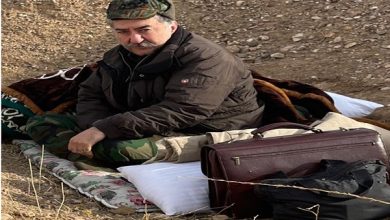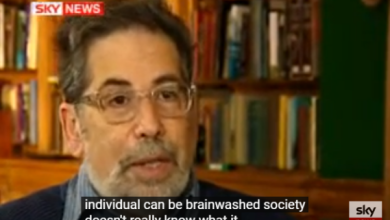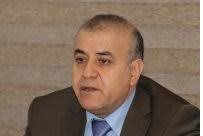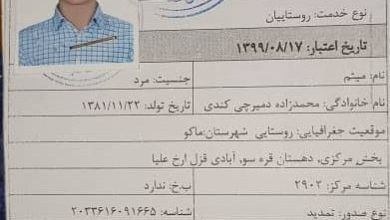Ms. Chiman Rasouli Kurdistani, a Kurdish woman and former member of the armed group Komala, is a child soldier!
In today’s world, many individuals choose to change the course of their lives for various social, economic, and familial reasons. These changes sometimes lead to difficult and challenging choices that can have profound effects on the individual and those around them. Chiman Rasouli’s story is an example of such transformations. Facing family problems and seeking a way to escape difficult circumstances, Ms. Rasouli joined the Komala group. Despite having two young children, she left the country with the help of her brother, hoping to find a way to improve her situation by joining the armed group Komala. Her story not only narrates her personal journey but also highlights the social and familial complexities that drive individuals to make life-altering decisions.
Ms. Chiman Rasouli, a Kurdish woman and former member of the armed group Komala (daughter of Nasser, born on May 11, 1996, in Sanandaj), is a child soldier! In 2021, at the age of 15 and with two young children, she decided to join the Komala group due to family problems and to escape the constant harassment and abuse from her ex-husband, as well as the lack of family support. She left her two children behind with the help of her brother, Akam Rasouli Kurdistani, who had joined Komala two years prior. She illegally left the country and went to Komala headquarters in northern Iraq. After undergoing a 16-month training period within the group, she left after her husband agreed to a divorce and returned to Iran.
Family is a fundamental pillar in shaping an individual’s identity, and family problems can have a deep impact on a person’s life. In Ms. Rasouli’s case, the challenges and family issues not only affected her mental well-being but also influenced the trajectory of her life. In a society where traditional values are dominant, family pressures can push individuals towards unexpected choices. Despite her young age and maternal responsibilities, Chiman Rasouli sought a way to escape the abuse from her ex-husband and difficult family conditions, ultimately changing the course of her life. This choice not only reflects her critical situation but can also be analyzed as a social reaction to the inequalities and limitations present in society.
Question: Please introduce yourself.
Chiman Rasouli: I am Chiman Rasouli, from Sanandaj, and I was born in 1996. My education went up to the fifth grade of elementary school. Due to my family circumstances and social environment, I couldn’t continue my education. From childhood, life was not easy for me. I married very young, perhaps earlier than I should have. At that time, I thought I was entering a peaceful life, but unfortunately, I only stepped into a new cycle of violence. From childhood, I struggled with economic and social problems, and these issues greatly affected me.
In my teenage years, due to the pressures I felt from my family and society, I married very young. Perhaps it can be said that this decision was one of the biggest mistakes of my life. At that time, I thought that by entering married life, I would achieve the peace and stability I had always longed for. But reality turned out differently. After marriage, I realized that I had entered a new cycle of violence and problems. Instead of being filled with love and support, married life was full of tensions and conflicts that intensified every day. I felt trapped in a prison with no escape. This situation not only affected my morale but also had negative effects on my physical and mental health.
Question: Why did you join Komala? Were you aware of the group’s nature? Were you interested in armed actions?
Chiman Rasouli: Regarding my membership in Komala, I must say that I was a victim of domestic violence. For years, I was subjected to abuse and beatings by my husband, and during this time, no one, neither my family nor society, offered me any support. Everyone just told me that I had to endure and accept this situation. In these difficult circumstances, I had two children: a young daughter and son whose future worried me more than anything else. However, I reached a point where I could no longer continue and was truly broken.
Mentally, I was in a very critical state, and I would have chosen any path to escape this hell. At that time, my brother Akam, who had joined Komala two years before me, contacted me and said, “If you really can’t continue, come here.” I will never forget that sentence. Although I knew I was leaving my children behind, there was no other way for me. My husband was not willing to divorce me under any circumstances, my family offered no support, and I myself had reached my breaking point.
These conditions severely affected my morale, and I felt that the only way to save myself was to join Komala. The decision I made, despite all my worries and doubts, was a kind of hope for escaping a life full of violence and stress. For the sake of my children, I promised myself that I would strive for a better future and look for a way to not only save myself but also build a bright future for my children. But when I entered Komala, I realized that I myself was under threat!
Question: How did you leave the country and join Komala?
Chiman Rasouli: Crossing the border was one of the most difficult and dangerous experiences of my life. It was not only physically challenging but also highly illegal and full of potential dangers. However, at that moment, nothing else mattered to me. The life I was trapped in was so unbearable and tormenting that I could no longer endure it. My only wish was to get away from that life full of violence and fear and reach a place where I could breathe again.
After enduring tense and stressful moments, I finally reached northern Iraq. There, I felt one step closer to freedom. All this time, the only thing on my mind was my brother Akam, who had joined Komala two years prior. He had always told me that if I ever needed help, I could turn to him. When I arrived at one of Komala’s headquarters, my heart was beating faster with excitement and anxiety.
That moment was very precious to me; I felt that after years of pain and suffering, I had finally reached a safe place. My brother’s presence and support were very important to me. At that moment, I felt that I was no longer alone.
Question: What were the living and training conditions like at the headquarters? Did they meet your expectations?
Chiman Rasouli: No, not at all. I thought that at least I would find people like myself there; people who had suffered pain and hardship. But the reality was very different. The conditions were very difficult. From the very first days, we had to wake up early, hike in the mountains, and undergo military training. After that, ideological classes were held, which talked about political issues, the history of the group, and the oppression of the Iranian government. Everything had a propaganda feel and was full of slogans and hatred.
I felt like they were shaping our minds and not trying to help us have a better life. It was as if we were not human beings but just tools to achieve their goals. No one asked about my pain; I just had to fit into that system. There was no support. Even when I missed my children and cried, they would just say, “You have to be strong.”
Question: How long were you in the group, and what made you decide to leave?
Chiman Rasouli: I was there for nearly 16 months, and during this time, I was always struggling with internal conflicts. Missing my children and regretting leaving them consumed my mind. Until my husband finally decided to divorce me after a long time. This untied a big knot in my life, and I felt it was time for me to leave the group. I told the group leaders that I no longer wanted to stay. At first, they opposed it and said that returning was dangerous and I might be arrested, but I insisted and said that I did not want to continue in any way. Eventually, they agreed, and I left them after that difficult period.
Question: What happened after you left the group? How did you return to Iran?
Chiman Rasouli: I stayed in that region for a while and thought maybe I would go somewhere else, but I missed my children more and more every day. My heart ached for my children, for myself, and for the simple life that had been taken from me. In the end, I decided to surrender. I returned to Iran and turned myself in.
Question: What was the treatment like upon your return? Were you afraid of anything?
Chiman Rasouli: Yes, I was very worried, especially about the possibility of being arrested or harassed. But when I returned, they only asked me a few questions and treated me very respectfully. After that, I was released and was able to return to my normal life. Thank God, there is no news of those pains now. I am trying to have a peaceful life, without violence and coercion, and alongside my children. I made a mistake, but now I am only thinking about rebuilding.






